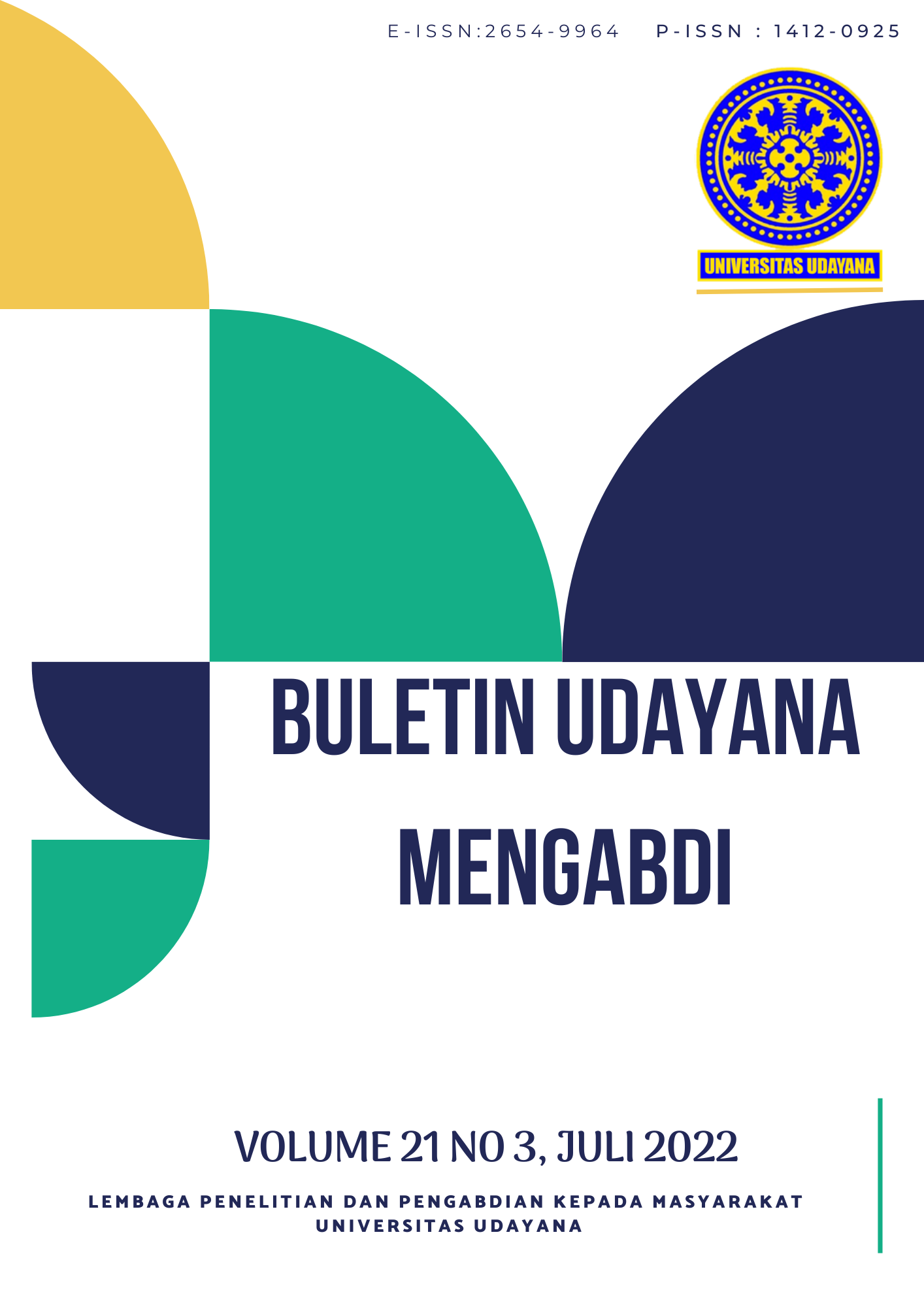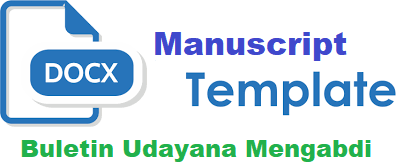PENGELOLAAN SAMPAH ORGANIK BERBASIS SKALA RUMAH TANGGA DI DESA LEBIH GIANYAR BALI
Abstract
Composting technology and eco-enzyme are two alternatives that can be done to reduce organic waste pollution in the environment. The purpose of this activity is to provide information to the community at the household scale regarding the application of composting technology and eco-enzyme in organic waste management, so that it is expected to be an entrepreneurial idea and an effort to save the environment. The service was carried out in the village of Lebih, Gianyar, Bali. The activity was carried out through the stages of site survey, socialization, training on composting and eco-enzyme using organic waste. The output of this activity is expected to be fostered by households in the Lebih Coastal Area, to be able to develop technology and ideas the entrepreneurial spirit of environmentally-based communities, and to increase public awareness in efforts to save the environment in general. The implementation of the service on composting and eco-enzyme training was attended by the community of Lebih Village, which consisted of village officials, village residents, village youths, and academics from Udayana University. The training was provided by two speakers from Urban Kompos and Griya Luhu. In the implementation of the training, the community was very enthusiastic and able to understand the training materials. It is hoped that the community will continue to manage waste properly, and in the future, it can be and sustainable, so that the problem of waste, especially on a home scale, can be resolved.
Keywords : Eco-enzyme, composting, lebih beach, environmentally friendly
Downloads
References
Baenanda, L. (2018). Indonesia Negara Pemproduksi Sampah Nomor 2 di Dunia. Mengapa ? Binus University. https://binus.ac.id/knowledge/2019/11/indonesia-negara-pemroduksi-sampah-terbanyak-nomor-2-di-dunia-mengapa/#:~:text=Product %26 Services-,Indonesia Negara Pemroduksi Sampah Terbanyak Nomor 2 di,Mengapa%3F&text=Indonesia saat ini menduduki peringkat,berada satu peringkat dibawah China.
Dewi, I. N., R. Ida., Sumarjan dan Jannah, H. (2020). Pemberdayaan Masyarakat Melalui Pengelolaan Sampah Skala Rumah Tangga Menggunakan Metode Komposting. Sasambo: Jurnal Abdimas (Journal of Community Service), Vol 2 (1), 12–18.
Eco-Enzym. Jurnal Pengabdian Papua: Vol 5: 1, 34-39.
Hemalatha, M., & Visantini, P. (2020). Potential use of eco-enzyme for the treatment of metal based effluent. IOP Conference Series: Materials Science and Engineering, 716, 012016. https://doi.org/10.1088/1757-899X/716/1/012016
Mahyudin, R. P. (2017). Kajian Permasalahan Pengelolaan Sampah Dan Dampak. Teknik Lingkungan, Vol 3 (1), 66–74.
Mardiani, I. N., N. Nurhidayanti., M. Huda. (2021). Sosialisasi Pemanfaatan Limbah Organik Sebagai Bahan Baku Pembuatan Eco Enzim Bagi Warga Desa Jatireja Kecamatan Cikarang Timur Kabupaten Bekasi. Abdimas Pelita Bangsa: Vol 2:1, 42-47.
Puspita, D. R. (2017). Studi Potensi Pemanfaatan Sampah Organik Tpa Banyuurip Tegalrejo Sebagai Salah Satu Sumber Energi. Jurnal Teknik Mesin, Vol 6 (3), 155. https://doi.org/10.22441/jtm.v6i3.1965
Rambe, T. R. (2021). Sosialisasi Dan Aktualisasi Eco-Enzyme Sebagai AlternatifPengolahan Sampah Organik Berbasis Masyarakat Di Lingkungan Perumahan Cluster Pondok II. Jurnal Pengabdian Kepada Masyarakat (Jpkm): Vol 2:1, 36-41.
Salvi, S. (2020). Application of Eco-Enzyme for Domestic Waste Water Treatment. International Journal for Research in Engineering Application & Management (IJREAM), Vol 05 (11), 114–116. https://www.academia.edu/42742619/Application_of_Eco-Enzyme_for_Domestic_Waste_Water_Treatment%0D
Singh, J., Laurenti, R., Sinha, R., & Frostell, B. (2014). Progress and challenges to the global waste management system. Waste Management & Research, Vol 32 (9), 800–812. https://doi.org/10.1177/0734242X14537868
Suhastyo, A.A. (2017). Pemberdayaan Masyarakat Melalui Pelatihan Pembuatan Pupuk Kompos. Jurnal Pengabdian Dan Pemberdayaan Masyarakat: Vol 1: 2, 63-68
Sujarta. P. dan M. L. Simonapendi. (2021). Pelatihan Pengolahan Sampah Organik Dengan Konsep
Sutrisnawati, N. K. and M.Purwahita, A. R. (2018). Fenomena Sampah Dan Pariwisata Bali. Jurnal Ilmiah Hospitality Management, Vol 9 (1), pp. 49-56.
Uzoigwe, C., Ennis, C. J., & Rahman, P. K. S. M. (2015). Production of Biosurfactants Using Eco-friendly Microorganisms. In Environmental Sustainability (pp. 185–204). Springer India. https://doi.org/10.1007/978-81-322-2056-5_11
Winarsih, N. W.E, I. M. W. Candranegara dan I. P. E. Mahardhika. (2019). Efektivitas Pengelolaan Sampah di Kota Denpasar (Suatu Penelitian di Dinas Lingkungan Hidup dan Kebersihan Kota Denpasar). SINTESA: Jurnal Ilmu Sosial dan Ilmu Politik. Vol 10:2, 74-77.

This work is licensed under a Creative Commons Attribution-ShareAlike 4.0 International License.

This work is licensed under a Creative Commons Attribution-ShareAlike 4.0 International License.




.png)


1.png) GARUDA - GARBA RUJUKAN DIGITAL
GARUDA - GARBA RUJUKAN DIGITAL



